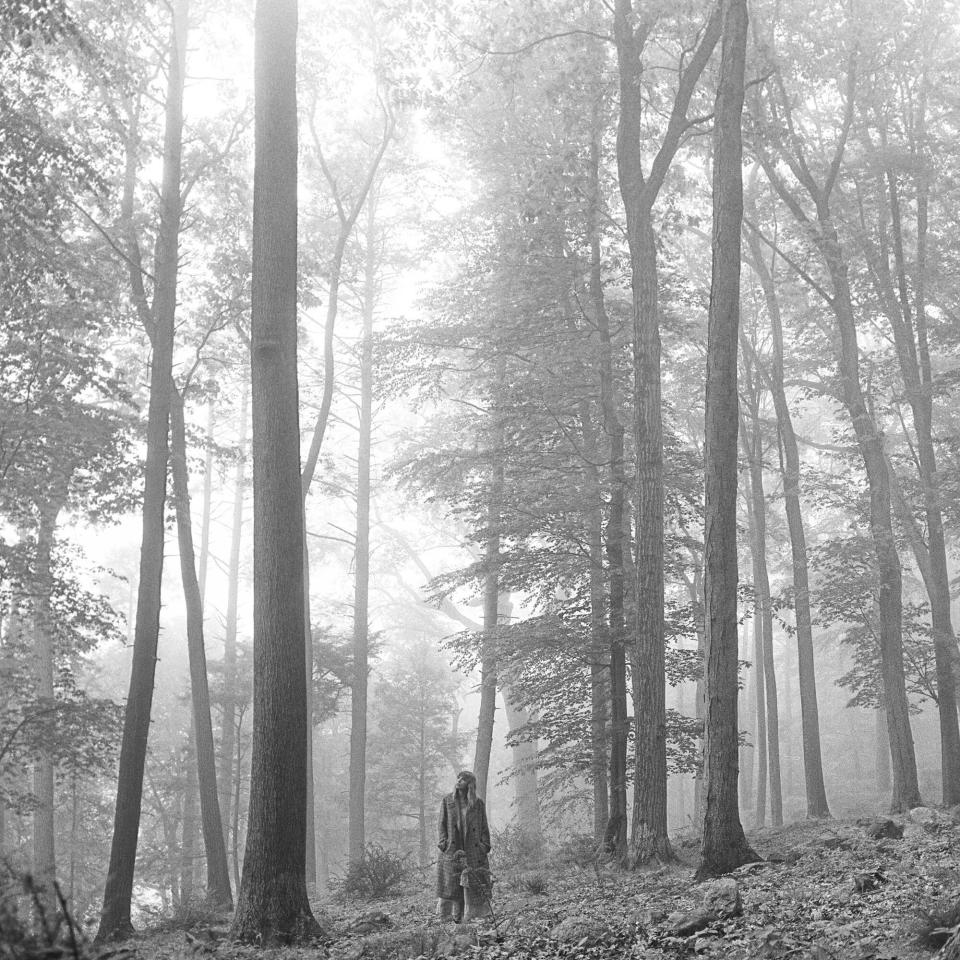Taylor Swift forges her own path on the confident Folklore
The summer of 2020 was going to be a grand one for Taylor Swift — her original plans involved celebrating 2019's Lover at festivals around the world, including England's legendary Glastonbury Festival, and throwing multi-day, multi-artist affairs in Massachusetts and California. But the COVID-19 pandemic, and its attendant lockdowns, led to all those plans being postponed, if not canceled outright.
Some people used the time that opened up because of quarantine to try something new — writing a thousand words a day, fixing nagging household issues, turning elaborate baking projects into the core of a cookbook. Swift took on the challenge as well: "Surprise 🤗," she posted on social media Thursday morning. "Tonight at midnight I’ll be releasing my 8th studio album, folklore; an entire brand new album of songs I’ve poured all of my whims, dreams, fears, and musings into." The attached images were stark, and in a muted palette far from the pastels that colored the Lover era: in one image, Swift stood alone in a misty forest, while in the other, serif text offered more details on the album's genesis and personnel.
If the era spanning 1989 through Lover was, as Swift said during her announcement of that 2014 album, characterized by her releasing "documented, official pop album[s]," Folklore represents a shift — not fully out of pop, but perhaps adjacent to it. Not only is it lacking the splashy lead single and lengthy rollout of her previous albums, it also finds Swift experimenting with different ideas — or, as she puts it on the simmering yet wistful opener "The 1," "I'm doin' good, I'm on some new s–t/ been sayin' yes instead of no."
Swift explodes the expectations of anyone preparing to call her music "diaristic," writing songs from different perspectives while putting her already-detailed work under a microscope. It's reflective of how time spent alone can force one not only to look inward, but to get so tired of doing so that they're forced to find other stories so they can stay amused. Swift's exploration of others' inner worlds — the exhausted front-liners of the spectral "Epiphany," the truth-teller surveying the scorched earth on "Mad Woman," the love-tangled teenagers populating the triptych of "Cardigan," "August, and "Betty" — allows her to take on new voices.

Universal Music
Folklore mostly abandons Lover's festival-sized splendor for songs that reveal more facets with repeated listens. Swift wrote and recorded her parts for Folklore in Los Angeles, while others, led by longtime collaborator Jack Antonoff and Aaron Dessner of the art-rock outfit the National, worked on their contributions, which included songwriting, production, and instrumentation, at their own studios.
People tend to overstate the importance of collaborators when they talk about Swift's music, even though every song she performs contains certain aspects — vocal lines, melodic shifts, bridge structures — that are undeniably hers. But Dessner's brother — and co-member of the National — Bryce, who also has an extensive resume as a composer, supplied orchestrations, and his canny arrangements give a crackling energy to Swift's Nashville-honed, chart-polished songwriting.
Take "Seven," the midpoint of the album, which reflects on a troubled young friend. Swift's voice on the chorus has a roundness to it that makes its plea to recall childhood ferocity even more pungent; strings lurk around the piano-forward arrangement's edges before coming to the fore near its close, their eventual blurring adding a poignancy to the lyrics' dreams of escape. The confident amble of "Cardigan" — the slightly embittered lyrics of which pay off at the album's end, with the twangily contrite "Betty" — has its façade disturbed by the distorted strings at its close. The story of "Mad Woman," meanwhile, is given extra hell-borne dread by swirling vocals that threaten to take over the piano line acting as its anchor.
Swift is still very much a pop star — even a split-second glance at social media could tell you that — but Folklore, instead of going along with what's topping the Hot 100, uses "pop" as a way to introduce deeper, knottier characters. On the surface, "Mirrorball" recalls a gauze-wrapped last-dance song, but its lyrics belie a fragmented, outwardly defined sense of self that yearns for balance. "This is Me Trying" cloaks Swift's narrator's taking stock in where her life is — "I got wasted like all my potential," she notes in one particularly lacerating line — in reverb and billowy guitars. "Exile," a duet with Bon Iver, aches as it expands and contracts, with Justin Vernon's low croon and Swift's velvet-lined alto engaging in a cold war that crests on the song's bridge, the two echoing accusations at one another yet unable to disengage. It's not all a downer: "Invisible String" is all hushed delight at finding connection with another, Swift detailing the healed wounds and gentle pleasures that pave the way to growth and happiness. But it's very in tune with the reflection that comes with sitting in even the most well-outfitted homes.
"Before this year I probably would've overthought when to release this music at the 'perfect' time," Swift wrote in the announcement announcing Folklore, "but the times we're living in keep reminding me that nothing is guaranteed." The maturity and confidence of that statement are reflected in Folklore, a content smile of an album on which one of the world's biggest pop stars, charts be damned, forges her own path and dares listeners to come along for the ride. A
Related content:

